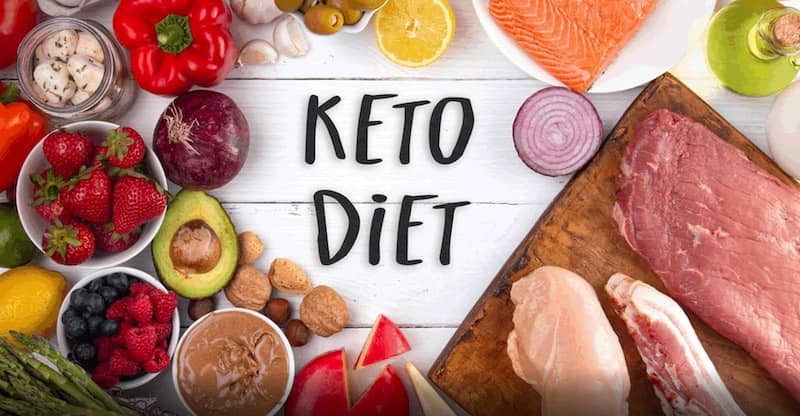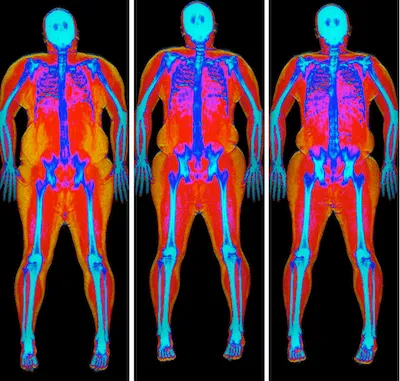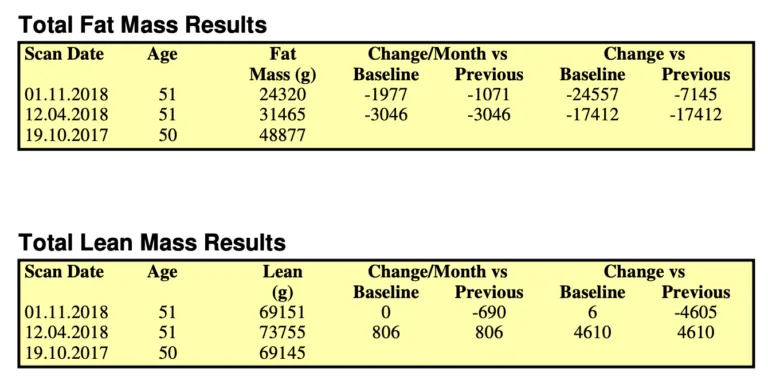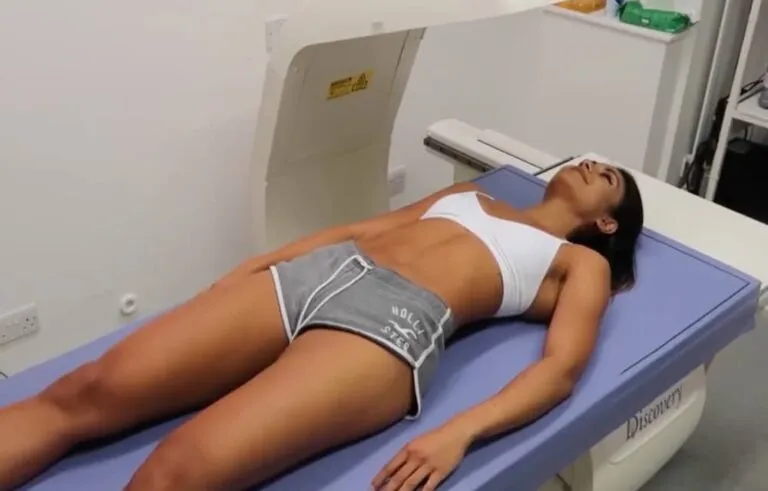
Many Bodyscan customers sing the praises of a ketogenic diet and attribute their successful fat-loss to it.
The DEXA scan results below of a man in his fifties show an incredible result after one year on a keto diet. He lost an incredible 24.5kg (54lbs, nearly four stone) in one year with absolutely no loss of lean mass.


But what is a ketogenic diet, is it really more effective for fat-loss than other diet plans, is it good for muscle gain too, and is it safe?
What is a ketogenic diet?
A ketogenic diet is defined as a diet that restricts carbohydrate intake to around 50g per day or less. This is slightly different to a “low carb” diet, which typically permits a range of 50-150g of carbs a day.
The forerunner of today’s ketogenic diet was something slightly different again called the Atkins diet, created and popularised by an American cardiologist Robert C Atkins. While Atkins begins with an ultra-low-carb, keto-style, intake, it gradually adds more carbs during subsequent phases.
Though carbohydrate intake must be very low for a diet to be truly ketogenic, intake of protein and dietary fat can vary from person to person.
What does a ketogenic diet do?
With a ‘normal’ diet, your body breaks downs dietary carbohydrates into glucose (a type of sugar), which enters the bloodstream and is used for energy to power you through the day. That’s why so-called energy drinks are high in carbs and why we often crave carbs after physical exercise.
By drastically restricting carbs and starving your body of glucose, a keto diet forces your body to find an alternative source of energy. This it does by breaking down fat into what are called ketone bodies. These ketone bodies effectively replace glucose as your body’s power source.
When you produce ketone bodies, you are said to have entered a state of ketosis. Note the difference between low-carb and high-fat: ketosis occurs when your body lacks carbohydrates as a primary fuel source and your body produces ketones. Ketosis does not occur just because of an increase in dietary fat.
Is a ketogenic diet plan better for fat loss than other diets?
Remember that a change in body mass is most closely related to energy balance over time. In other words, calories in must be less than calories out.
To that end, a ketogenic diet is one way to effect fat loss so long as it leads to a prolonged energy/calorie deficit over a sustained period.
But if that’s the case, why do ketogenic diets seem to produce such rapid and impressive results for weight loss? Here are four possible reasons why.
-
A ketogenic diet plan can lead to an improvement in overall diet composition
because of the ‘hyper-palatable’ and often calorie-dense foods (often junk
food) that have to be excluded. These tasty treats, such as chocolate,
cakes, crisps, pastries and pizza, are easy to overeat, so cutting them out
can automatically leads to a drastic reduction in overall calories
consumed.
It’s important to remember that a ketogenic diet is low-carb, not necessarily high fat. Whilst advocates of ketosis often insist that it is the high dietary fat that enables them to burn more body fat, it’s worth remembering that many of the foods that are off the table with a keto diet, like those above, are themselves very high in dietary fat.
-
With fewer carbs on the menu, protein intake usually increases to fill the
gap. Of all three macros (carbs, protein and fat), protein is the most
filling – eat a high-protein breakfast and you’ll likely eat less than usual
for lunch. Therefore increasing protein intake can lead to a spontaneous
reduction in total calories, creating the energy imbalance required for fat
loss.
-
Aside from the increase in dietary protein, hormonal and biological
adjustments to a ketogenic diet can have their own appetite-suppressing
effects, thereby decreasing the desire to eat. It is this reduction in
hunger that leads to fewer calories being consumed and hence weight-loss.
- The main reason for rapid weight-loss in the first couple of weeks of a ketogenic diet is due to water loss. We said at the start that dietary carbs are broken down into glucose that enters the bloodstream. Excess glucose is stored as glycogen in the muscles and liver. For every 1g of carbohydrate stored in the body as glycogen, we store at least 3g of water. So reducing carbs depletes glycogen which, with its water, can easily mean a quick and dramatic 1.5-2kg drop in water weight, not body fat.
Accurate body composition measurement, such as a DEXA scan, will reveal whether weight-loss is actually body fat. DEXA scans at Bodyscan typically show that indiviudals seeking to drop body fat lose a kilo of lean mass for every three kilos of body fat. On a ketogenic diet plan, the ratio of lean-to-fat will be much higher, perhaps 2:3 or even 1:1, in the first couple of months. This is mainly body water.
The big ketogenic misunderstanding
Ketogenic diets and the state of ketosis are often sold with a disingenuous sleight of hand. Keto evangelists say that ultra-low-carb diets are superior to others because they burn more fat. Technically, that is true, but on a ketogenic diet you have much more fat to burn because of the big increase in dietary fat. A ketogenic diet does not necessarily mean you are burning stored body fat (adipose tissue), the stuff you are ultimately trying to reduce.
A classic study by Hall and colleagues in a tightly controlled metabolic ward setting, showed that carbohydrate restriction was not physiologically advantageous for fat loss. It compared the effect of different carbohydrate and fat intakes while holding calories and protein constant in an overall calorie deficit 30% below maintenance. (If anything, fat loss was greater in those who restricted fat rather than carbs, although by a tiny 36g per day.)
In other words, a ketogenic diet is not superior for fat loss beyond restricting total calories.
Is a ketogenic diet safe?
Safety concerns around being in a prolonged state of ketosis usually focus on three areas:
i) a condition known as ketoacidosis (dangerously high levels of ketone bodies
usually brought about by diabetes)
ii) concern that long periods without
carbs may be dangerous
iii) concern that diets high in animal
products/fats are unhealthy
There is no sustained, reliable, long-term evidence to give credence to these ketogenic worries.
i) Yes, ketone bodies are acidic but blood acidity is well regulated by our kidneys and lungs, and there have only been one or two reported cases of ketoacidosis in non-diabetics.
ii) Second, carbohydrate is not an essential nutrient and your body can produce what it needs through a process known as gluconeogenesis.
iii) Third, studies on diets containing animal products and animal fats continue to vary considerably in their conclusions. Not only are many studies biased because they are funded by vested interests (eg, the beef industry) but it is inherently difficult, nigh impossible, to reliably track dietary intake across thousands of individuals over many years, so there are no long-term (5-10 year) studies and hence imperfect evidence. In non-trial studies, any detrimental effects (eg, cholesterol) are correlated with processed red meat rather than unprocessed red meat, which appear to have minimal or no detrimental effects.
Long-term trials are needed to provide evidence that keto diets are inherently unsafe.
Is a ketogenic diet good for building muscle?

A recent meta-analysis assessed the effects of ketogenic diets on a number of body composition outcomes (one of which included gains in lean mass) in weightlifters. Compared to non-ketogenic diets, a ketogenic diet led to greater losses in lean mass (-1.26 kg).
However, as we noted above, keto diets reduce carbohydrates and, in turn, glycogen and the water stored with it. Water is a component of lean mass, so it’s likely that the drop in lean mass is due to water loss rather than skeletal muscle.
That said, these results match up with other studies suggesting that ketogenic diets may lead to less gain in strength and muscle mass when compared to non-ketogenic diets. It is absolutely possible for individuals to make fantastic gains in muscle mass on a ketogenic diet, it’s just likely not the ‘best’ diet to build and/or maintain muscle.
If you want to measure lean gain effectively, a DEXA scan is the best way to do this, though we would recommend tracking progress over an extended period of, say, six months, with two to three scans.
Ultimately, is a ketogenic diet worth it for fat loss?
The truth is that cutting carbohydrate can be a good way to lose body fat for those who struggle with hunger management and like to follow simple rules, or who simply find it easy to restrict carb-rich foods in comparison to dietary fat-rich foods.
If, however, drastically reducing your carb intake reduces your performance, makes you feel miserable, tired and moody, then a keto diet plan is probably not for you.
It is how well you stick to your diet (keto or otherwise) which will dictate fat-loss success and it’s also the biggest predictor for long-term weight maintenance. We are all different and we do not live in a lab. What works for one person may not work for you. An individualised approach is often best.
A ketogenic diet is simply a tool in the fat-loss arsenal and can work wonders for some. Is it the best diet for everyone, in every situation? Definitely not.
A DEXA scan can tell you if your ketogenic diet is working
As we’ve said above, a DEXA scan is the most reliable and consistent way to measure your changing body composition. Big drops in body weight may sound impressive but no one really embarks on a diet to lose weight. What you really want to lose is fat, and keto can paint a misleading picture by encouraging big falls in body water.

The best time to take a DEXA scan is at the start of your campaign or, if you’ve already started, as soon as possible. Follow-up DEXA scans should ‘book end’ a period of consistency, so if you are thinking of switching to or from a keto diet plan, then have a scan when you switch. That way you’ll be measuring something ‘pure’ and tangible, rather than a mix of routines and diets.
BOOK YOUR FIRST DEXA SCAN